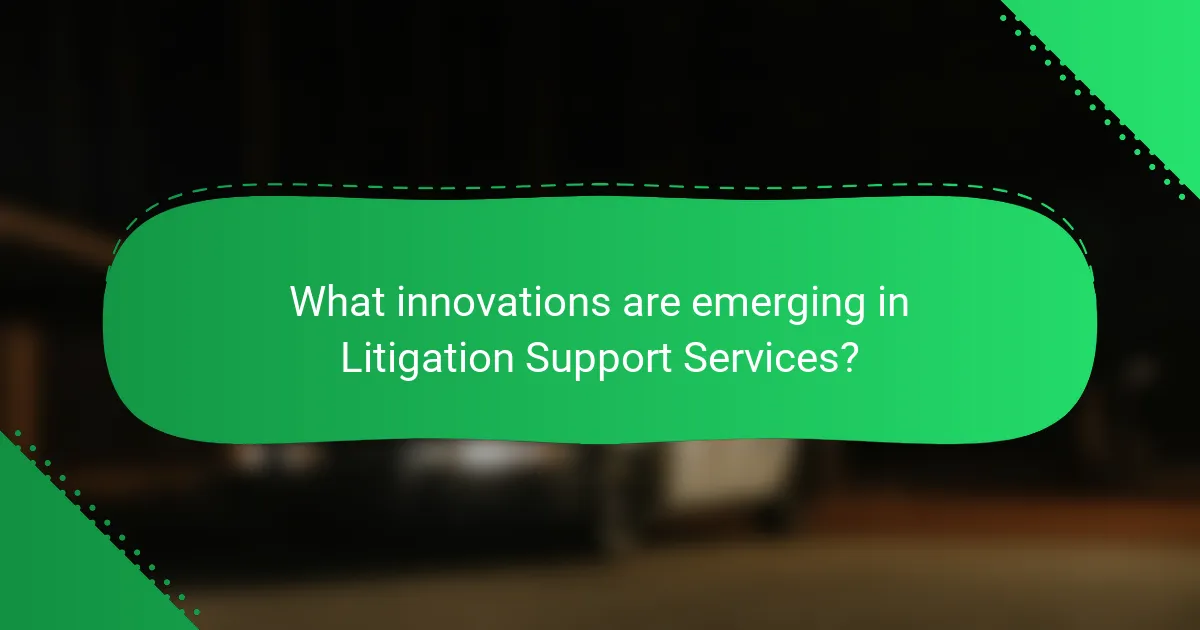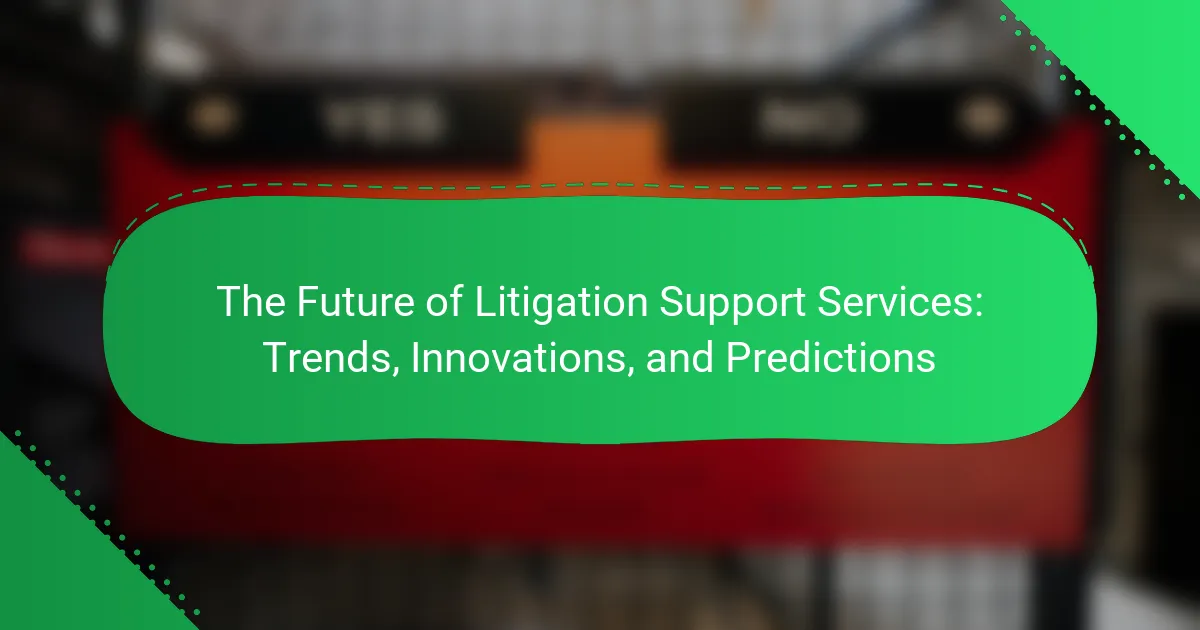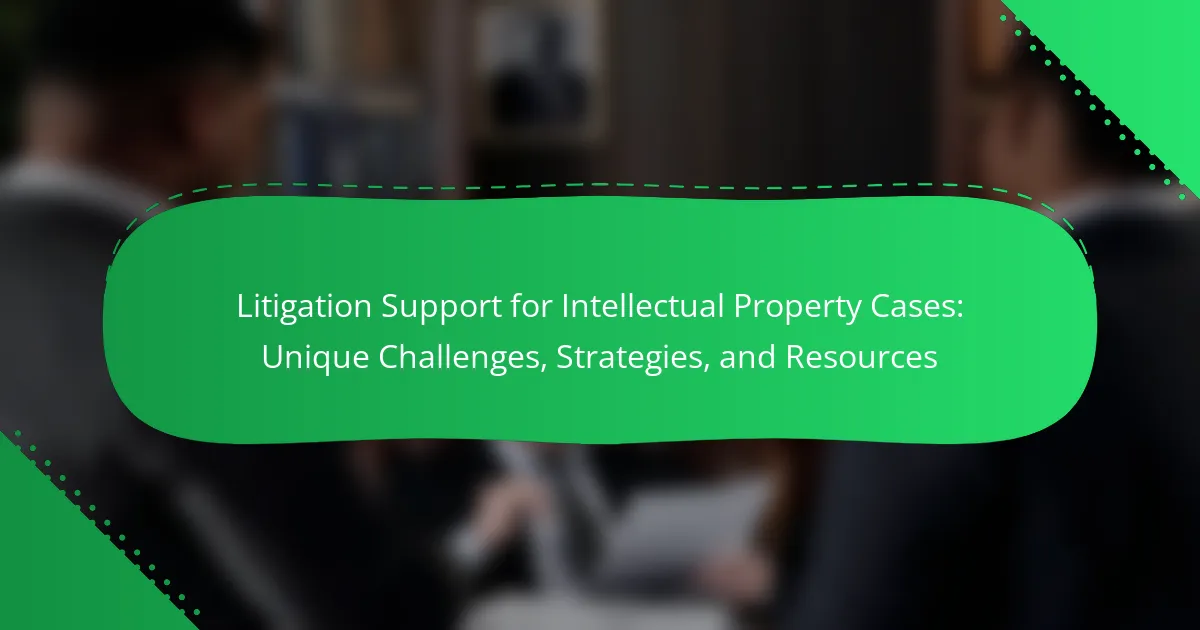Litigation support services are specialized offerings that assist legal professionals in managing cases through document management, legal research, trial preparation, and e-discovery. The article explores current trends and innovations in these services, highlighting the significant role of advanced technologies such as artificial intelligence, cloud-based solutions, and enhanced data analytics. These innovations are transforming traditional litigation practices by improving efficiency, accuracy, and collaboration among legal teams. The future of litigation support services will focus on integrating advanced technologies, increasing demand for e-discovery, and emphasizing cybersecurity measures for sensitive data handling. Overall, the article provides insights into how these advancements will shape the legal landscape.

What are Litigation Support Services?
Litigation support services are specialized services that assist legal professionals in managing cases. These services include document management, legal research, and trial preparation. They help streamline workflows and improve efficiency in legal proceedings. Litigation support can also encompass e-discovery, which involves the identification and analysis of electronic data. The use of technology in these services has grown significantly, enhancing the accuracy and speed of legal processes. According to a report by the American Bar Association, 90% of legal professionals rely on litigation support services to improve case outcomes.
How do Litigation Support Services function in legal processes?
Litigation Support Services assist legal processes by providing specialized resources and expertise. These services include document management, electronic discovery, and trial preparation. They help law firms organize and analyze large volumes of data efficiently. For example, e-discovery tools streamline the process of gathering and reviewing evidence. Litigation support professionals may also create demonstrative evidence for trial presentations. Their involvement enhances the accuracy and effectiveness of legal arguments. According to the American Bar Association, effective litigation support can significantly reduce trial preparation time. Thus, these services play a crucial role in modern legal proceedings.
What are the key components of Litigation Support Services?
The key components of Litigation Support Services include electronic discovery, document management, and trial preparation. Electronic discovery involves the identification, collection, and analysis of electronic data. This process is crucial for gathering evidence in a digital format. Document management refers to organizing and maintaining legal documents efficiently. It ensures easy access and retrieval of necessary files during litigation. Trial preparation encompasses the development of strategies, presentation materials, and witness preparation. These components work together to enhance the efficiency and effectiveness of legal proceedings.
How do these components interact with legal teams?
These components interact with legal teams by streamlining communication and enhancing efficiency. They facilitate the organization of case data, improving accessibility for legal professionals. Legal teams utilize these components to analyze evidence and manage documentation effectively. This interaction allows for better collaboration among team members. It also aids in preparing for court presentations and developing strategies. The integration of technology in litigation support enhances accuracy in legal processes. Overall, these components are essential for modern legal practices, as they reduce time spent on administrative tasks.
What trends are shaping the future of Litigation Support Services?
Increased reliance on technology is shaping the future of Litigation Support Services. Artificial intelligence is streamlining document review processes. Machine learning algorithms enhance predictive coding for case outcomes. Cloud-based solutions are improving collaboration among legal teams. Data analytics is being utilized for better case strategy formulation. Remote access to litigation support tools is becoming essential. Cybersecurity measures are increasingly critical due to sensitive data handling. These trends indicate a shift towards more efficient and secure litigation processes.
How is technology influencing the evolution of these services?
Technology is significantly influencing the evolution of litigation support services. Advanced software solutions streamline document management and review processes. Artificial intelligence enhances legal research efficiency and accuracy. Cloud computing enables secure remote access to case files and collaboration among legal teams. Data analytics provides insights into case trends and outcomes, supporting strategic decision-making. E-discovery tools automate the identification and collection of relevant electronic evidence. These technological advancements lead to cost reductions and faster case resolutions. According to a 2021 report by the International Legal Technology Association, 78% of firms reported improved efficiency due to technology adoption in litigation support.
What role does data analytics play in modern Litigation Support?
Data analytics plays a crucial role in modern litigation support by enhancing the efficiency and effectiveness of legal processes. It enables attorneys to sift through large volumes of data quickly. This capability allows for the identification of relevant information that can impact case outcomes. Data analytics also aids in predicting litigation trends based on historical data. For instance, statistical analysis can reveal patterns in case rulings. Furthermore, advanced analytics tools can assist in e-discovery by pinpointing key documents and evidence. The integration of data analytics in litigation support has been shown to reduce costs and save time. A study by the American Bar Association found that firms using analytics reported improved case management and strategy formulation.

What innovations are emerging in Litigation Support Services?
Emerging innovations in Litigation Support Services include advanced artificial intelligence tools, cloud-based solutions, and enhanced data analytics. AI tools streamline document review processes, significantly reducing time and costs. Cloud solutions facilitate remote access to case files, improving collaboration among legal teams. Enhanced data analytics provide deeper insights into case strategies and outcomes. These innovations are transforming traditional litigation practices by increasing efficiency and accuracy. For instance, AI can analyze thousands of documents in hours, a task that previously took weeks. Cloud platforms also allow real-time updates and sharing, which is crucial in fast-paced legal environments. Overall, these advancements are reshaping how legal professionals approach litigation support.
How are artificial intelligence and machine learning transforming these services?
Artificial intelligence and machine learning are revolutionizing litigation support services by enhancing efficiency and accuracy. These technologies automate document review processes, significantly reducing the time required to analyze large volumes of data. For instance, AI algorithms can quickly identify relevant documents, leading to faster case preparation. Machine learning models improve over time by learning from previous cases, which enhances their predictive capabilities. The integration of AI tools allows for better case outcome predictions and risk assessments. Additionally, these technologies facilitate advanced data analytics, providing deeper insights into legal trends. As a result, law firms can make more informed decisions based on comprehensive data analysis. The adoption of AI and machine learning in litigation support services is expected to continue growing, transforming how legal professionals operate.
What specific applications of AI are being utilized in Litigation Support?
AI applications in litigation support include document review, legal research, predictive analytics, and case outcome prediction. Document review utilizes AI algorithms to analyze and categorize large volumes of data efficiently. This reduces time and costs associated with manual reviews. Legal research employs AI to quickly find relevant case law and statutes, enhancing the research process. Predictive analytics assesses past case outcomes to forecast future results, aiding lawyers in strategy development. Additionally, AI tools can assist in e-discovery, identifying pertinent information in electronic documents. These applications streamline processes and improve overall efficiency in legal practices.
How can machine learning improve case outcomes?
Machine learning can improve case outcomes by enhancing data analysis and predictive accuracy. It analyzes large volumes of legal data quickly and identifies patterns that humans may overlook. This capability allows for better case strategy development. Machine learning algorithms can predict case outcomes based on historical data. For instance, a study by the Stanford Law School found that machine learning models could predict court decisions with over 70% accuracy. Additionally, machine learning can assist in document review, reducing time and costs. It automates the identification of relevant documents, improving efficiency in the discovery process. Overall, machine learning streamlines legal workflows and supports informed decision-making.
What are the benefits of adopting new technologies in Litigation Support?
Adopting new technologies in litigation support enhances efficiency and accuracy. It streamlines document management, reducing time spent on manual tasks. Automation tools can quickly process large volumes of data. This reduces the risk of human error significantly. Advanced analytics provide deeper insights into case data. Technologies like e-discovery tools expedite the identification of relevant documents. Enhanced collaboration tools improve communication among legal teams. Additionally, cloud-based solutions offer secure, accessible storage for sensitive information.
How do these innovations enhance efficiency and accuracy?
Innovations in litigation support services enhance efficiency and accuracy through automation and advanced data analytics. Automation reduces manual tasks, allowing for quicker document review and case preparation. Advanced data analytics improves the precision of evidence identification and retrieval. These technologies streamline workflows, reducing time spent on repetitive tasks. For instance, AI-driven tools can analyze large volumes of data in minutes, a process that would take humans hours or days. This leads to faster case resolutions and improved client satisfaction. Additionally, enhanced accuracy minimizes human errors, ensuring that critical information is not overlooked. Overall, these innovations significantly transform the litigation process by making it more efficient and precise.
What cost-saving measures can be achieved through technological advancements?
Technological advancements can achieve significant cost-saving measures in various sectors. Automation reduces labor costs by streamlining repetitive tasks. Cloud computing minimizes infrastructure expenses through scalable storage solutions. Artificial intelligence enhances efficiency in data analysis, leading to quicker decision-making. Virtual collaboration tools decrease travel costs by enabling remote communication. Electronic discovery tools lower costs associated with document review and management. Predictive analytics help in forecasting legal outcomes, reducing unnecessary litigation expenses. Overall, these advancements drive operational efficiencies and lower overheads.

What predictions can be made about the future of Litigation Support Services?
Litigation Support Services will increasingly integrate advanced technologies. Artificial intelligence will enhance document review efficiency and accuracy. Predictive analytics will help in case strategy development. Remote access tools will facilitate collaboration among legal teams. Cloud-based solutions will improve data storage and security. The demand for e-discovery services will continue to rise. Cybersecurity measures will become critical due to sensitive data handling. Overall, the future will focus on efficiency, security, and technological integration in litigation support.
How will the demand for Litigation Support Services change in the coming years?
The demand for Litigation Support Services is expected to increase in the coming years. Factors driving this growth include a rise in complex litigation cases and an increase in regulatory requirements. Technology advancements, such as artificial intelligence and data analytics, will enhance service offerings. The legal industry is experiencing digital transformation, necessitating support services for e-discovery and document management. According to a report by MarketsandMarkets, the litigation support services market is projected to grow from $12.3 billion in 2021 to $20.5 billion by 2026. This indicates a compound annual growth rate (CAGR) of 10.8%. As law firms seek to improve efficiency and reduce costs, the reliance on specialized litigation support will likely expand.
What factors will drive the evolution of these services?
Technological advancements will drive the evolution of litigation support services. The integration of artificial intelligence enhances data analysis capabilities. Increased demand for efficiency pushes firms to adopt automated solutions. Regulatory changes require compliance adaptations in service offerings. Client expectations for transparency and accessibility influence service design. Competitive pressures compel firms to innovate and differentiate their services. These factors collectively shape the future landscape of litigation support services.
How might client expectations shape the future landscape?
Client expectations will significantly shape the future landscape of litigation support services. As clients increasingly demand transparency, service providers must adapt to meet these needs. This shift will drive the integration of advanced technologies, such as artificial intelligence and data analytics, to enhance service delivery. A 2022 survey indicated that 75% of clients prioritize real-time updates on case progress. Additionally, personalized services tailored to specific client needs will become essential. Firms that fail to adapt may lose competitive advantage. The evolving landscape will emphasize collaboration between clients and service providers. This collaboration will foster innovation and improve overall service quality.
What best practices should legal professionals adopt regarding Litigation Support Services?
Legal professionals should adopt best practices that enhance efficiency and accuracy in litigation support services. These practices include utilizing advanced technology for document management and review. Implementing e-discovery tools can streamline the process of collecting and analyzing evidence. Regular training on these tools ensures that legal teams remain proficient. Collaboration with IT specialists can improve data security and integrity. Establishing clear communication channels within the team promotes effective case management. Additionally, maintaining organized records facilitates easier access to information during litigation. These best practices contribute to a more effective litigation support process.
How can firms effectively integrate new technologies into their processes?
Firms can effectively integrate new technologies into their processes by conducting thorough assessments of their current workflows. This involves identifying areas where technology can enhance efficiency and productivity. Training staff on new tools is essential for successful adoption. Regular feedback loops can help to refine the integration process. Additionally, firms should prioritize scalability in technology solutions to accommodate future growth. Data security must also be a key consideration when implementing new systems. Research shows that organizations that invest in employee training see a 30% increase in technology adoption rates. These strategies collectively ensure a smooth transition to new technologies, ultimately improving operational effectiveness.
What strategies should be employed to stay ahead of industry trends?
To stay ahead of industry trends, organizations should implement continuous market research. This involves regularly analyzing competitor activities and emerging technologies. Engaging in networking with industry leaders can provide valuable insights. Attending relevant conferences and seminars keeps professionals informed about the latest developments. Additionally, adopting agile methodologies allows for quick adaptation to changes. Utilizing data analytics can help identify patterns and predict future trends. Investing in employee training ensures teams remain knowledgeable about new tools and practices. Finally, fostering a culture of innovation encourages proactive responses to industry shifts.
The main entity of this article is Litigation Support Services, which are specialized services designed to assist legal professionals in managing cases through document management, legal research, and trial preparation. The article outlines key components of these services, including electronic discovery and the integration of technology, which enhances efficiency and accuracy. It discusses emerging trends such as the increased use of artificial intelligence and data analytics, predicting that the demand for these services will grow significantly. Additionally, it highlights best practices for legal professionals to effectively integrate new technologies and stay ahead of industry trends, ensuring improved case outcomes and operational efficiencies.



